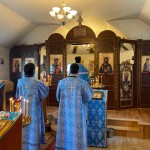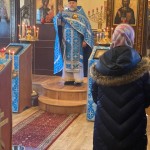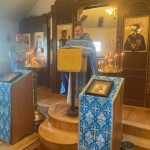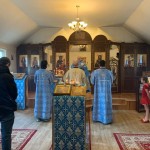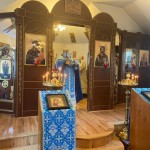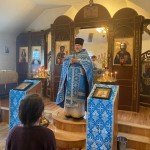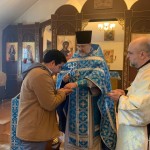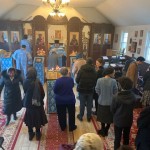On February 20, on the Sunday of the Prodigal Son, St. George parish had a beautiful celebration. Our Rector, Archpriest Igor Tarasov headed the Divine Liturgy in our temple. After the reading from the Holy Gospel he delivered the following homily:
“Dear brothers and sisters in Christ! On this Sunday the Church tells the parable of the Prodigal Son (Lk. 15, 11-32). It is a very profound and detailed instruction on repentance. Last Sunday we began to sing, “The doors of repentance open to me, o Giver of life”. It is important to remember about repentance these days. Last week we also celebrated feast of the Meeting. It reminded us about our spiritual destiny – to meet our Lord and God. Today’s parable is also about a meeting, the meeting between the Prodigal Son and his merciful Father. But today we may also talk about some other idea of today’s parable. It is about the Father who had two sons. Let us ask, “Who is the Father and who are the two sons in that parable?”.
“The Father represents God the Father, the Father of all mankind. The older son represents the Jewish people because alone of all people they knew the true God. They remained with the Father. They kept the memory of God having the Bible, the book describing God’s creation, the fall of mankind and telling that God will save His people, will send the Messiah. If we again recall feast of the Meeting, we may remember that holy elder Simeon who encountered Child Jesus in the Temple, recognized that Messiah in Him and proclaimed that this Child will be the glory of God’s people, Israel (Lk. 2, 32). So, the older son represents the chosen Jewish people”.
“On the other hand, the younger son represents the Gentiles, that is the pagan world. At the time of Christ, this meant the whole world except for the Jews. Unlike the Jews, the pagans had confused their memories of God the Creator with all sorts of false stories, myths and legends. They had confused the Creator with creation, and instead of worshiping God, they worshiped stones and rivers, the sun and the moon, kings and queens, thinking that they were gods and so making them into idols. The pagans, the younger son, had journeyed into “a far country” and there “wasted their possessions” (Lk. 15, 13). In other words, they distanced themselves from God, forgot His Truth, so wasting their spiritual inheritance. As a result, they suffered from “a severe famine”, in other words, from spiritual hunger, and so ate with “swine”, that is, ate with the illusions of the demons. However, they repented and turned back towards the Father, who welcomed them with open arms, running out towards them to embrace them”.
“And again recalling feast of the Meeting, we should remember that holy Jewish elder Simeon proclaimed that the Child Jesus, the Messiah will be “a light to bring revelation for the Gentiles” (Lk. 2, 31)”
“This parable is in fact a warning to the Jews. We can see the Father showing love and forgiveness towards the repentant son, who lies at His feet, begging forgiveness. The older son, however, is angry, full of bitterness and jealousy”.
“Perhaps we feel some sympathy with the older son. After all, he never wasted his possessions, he did remain loyal to the Father. The problem is that the older son’s service was a form of slavery; he did not stay with the Father out of love, but out of self-interest, in expectation of a reward. This was not love, but an obligation fulfilled in the hope of being paid. We can compare this with the attitude of the Father. He instantly forgives all that the younger son, the pagan world, has done and says: “Let us… be merry” (Lk. 15, 23). The attitude of the Father is not gloom, but joy. The older son, on the other hand, is full of gloom and cannot bring himself to be joyful or express love, because he has no love for his brother. The Father says: “All that I have is yours” (Lk. 15, 31), and shares everything. The older son wishes to share nothing, for he is locked up in pride and self-love. Indeed, the older son does not want to share in all that the Father has. He does want to share in His wealth and His property, but he does not want to share in what the Father has above all else – in His compassion and merciful love”.
“Thus, dear brothers and sisters, we are reminded of the words of the Apostle Paul, that though we may have all qualities, if we do not have love, then we are nothing (1 Cor. 13, 1-3). In this way, this parable has a meaning for us. We may have great wealth, wonderful gifts or talents, we may have a great profession, we may have a high position and a great power, but if we have no love, then all what we have is worthless. Then our lives themselves have no meaning. If there is no love, there is only the emptiness of vanity and the gloom of selfish pride”.
“Therefore, dear brothers and sisters, let us not imitate the older son from today’s parable, but let us learn from the merciful Father. Let us too be merry, for God the Father Most Compassionate and Merciful is waiting for us, prodigal children. Let us rejoice, for Jesus, the Lord of Love rejoices even out of the greatest sinner who repents. Let us be glad that all we prodigals are able to return to the Father and be embraced by His love!”
During the Litany of Fervent Supplication, the Rector had a petition beseeching the Lord to spare the faithful from the outbreak of the disease.
During preparation for Holy Communion the choir prayerfully performed hymns from the Lenten Triodion.
After the dismissal of the Liturgy the Rector made some announcements. Then he greeted Richard Beltran on the occasion of his name day. Fr. Igor wished our recently joined parishioner all divine blessings, fervent intercession of his patron Saint and many years. Traditional Polychronion was proclaimed and the Theotokian prosphora was handed.
After the Liturgy the Rector performed the Memorial Litia requested by Malyshev family.
Following all the services the Rector and parishioners continued their interaction during coffee hour. Then our Annual Parish Meeting was held right after that.

